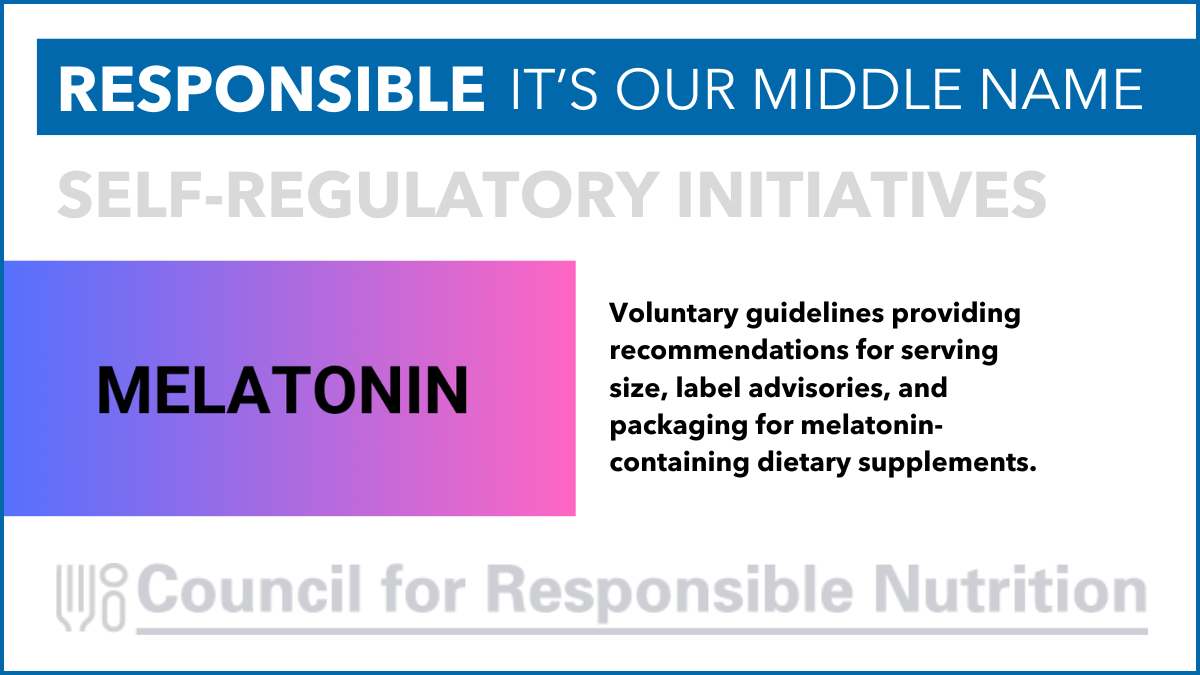UPDATED MARCH 2024
BACKGROUND:
Melatonin is a naturally occurring hormone made by the pineal gland which helps to control sleep and wake cycles. It is a dietary ingredient present in dietary supplements used for sleep support. Printable PDF
The safety of melatonin supplementation in various dosage formulations has been assessed in numerous clinical studies, as well as by authoritative and regulatory bodies. For example, the Institute of Medicine draft prototype monograph for melatonin indicates that for healthy adults, short-term use of melatonin in amounts of 10 mg or less per day does not raise concern of harm,1 and the Health Canada monograph for oral melatonin provides a dosing range of 0.1 to 10 mg per day.2,3 In addition, studies that provide supportive evidence of melatonin’s safety at higher levels are available.4
CRN supports and encourages responsible formulation and marketing of dietary supplements. Therefore, CRN has developed scientifically-based voluntary guidelines that address serving size recommendations determined from safety information, label advisories, and packaging recommendations for melatonin-containing dietary supplement products marketed for sleep support.
CRN recommends that its members follow these voluntary guidelines for their products containing melatonin that are marketed for sleep support in healthy individuals5, and encourages all dietary supplement producers and marketers to follow these recommendations.
VOLUNTARY GUIDELINES:
In addition to compliance with applicable labeling laws and regulations, CRN recommends that its members adhere to the following guidelines for the formulation, labeling, and packaging of melatonin-containing dietary supplements marketed for sleep support in healthy individuals:
A. Serving Size Recommendations
The serving size, as per stated labeling, should provide not more than 10 mg melatonin per day when used in accordance with the directions for use.
B. Intentional Overage Recommendations
FDA regulations require that dietary supplements contain at least 100 percent of the melatonin amount declared in the Supplement Facts panel throughout the product’s shelf life.6 The amount of any overage used to ensure this requirement is met in the finished product on market should be informed by data to support stability and safety.
C. Label Advisories for Conditions of Use
Firms should use these guidelines to design appropriate labeling statements for their products. Although the recommended statements may be replicated in wording, firms have the flexibility to use alternate phrasing that convey the key messages of the recommended statements.
1. Products Marketed for Adults
Product labels should include, but are not limited to, the following statements or similar language:
- For occasional and/or intermittent use only.
- For adult use only.
- Consult a healthcare professional:
- If you are experiencing long-term sleep difficulties.
- Before use if you are pregnant or nursing, if you have a medical condition, or are taking medication.
- Melatonin may cause drowsiness. If you feel groggy, do not drive or operate machinery.
- Do not take with alcohol.
- Keep out of the reach of children.
2. Products Marketed for Children
Product labels should include, but are not limited to, the following statements or similar language:
- For occasional and/or intermittent use only.
- Consult the child’s healthcare professional if the child has a medical condition or is
- taking medication.
- Consult the child’s healthcare professional for ongoing sleep difficulties.
- Product should not be a substitute for healthy sleep practices.
- Keep out of the reach of children.
D. Packaging Recommendations
Products containing melatonin that are in flavored chewable forms should be in child deterrent packaging.
E. Implementation
CRN recommends its members comply with these guidelines as soon as practicable, but no later than 18 months after adoption of the guidelines by the association.

Approved by CRN’s Board of Directors: March 28, 2024
1 IOM, 2004. Institute of Medicine Committee on the Framework for Evaluating the Safety of Dietary Supplements. Prototype monograph on melatonin. Dietary Supplement Ingredient Prototype Monographs, Developed as Examples for the Report Dietary Supplements: A Framework for Evaluating Safety. Institute of Medicine and the National Research Council of the National Academies, Washington (DC): National Academies Press 2004: D1-D71.
2 Health Canada, 2023. Monograph: Melatonin – Oral. http://webprod.hc-sc.gc.ca/nhpid- bdipsn/monoReq.do?id=136&lang=eng
3 For all uses except jet lag (dosing range specifically for jet lag is 0.5 to 10 mg per day).
4 Menczel Schrire Z, Phillips CL, Chapman JL, Duffy SL, Wong G, D'Rozario AL, Comas M, Raisin I, Saini B, Gordon CJ, McKinnon AC, Naismith SL, Marshall NS, Grunstein RR, Hoyos CM. Safety of higher doses of melatonin in adults: A systematic review and meta-analysis. J Pineal Res. 2022 Mar;72(2):e12782. doi: 10.1111/jpi.12782.
5 Products marketed for other purposes are outside the scope of these guidelines.
6 72 FR 34751 at 34884 (Preamble to the final rule for dietary supplement GMPs) https://www.federalregister.gov/documents/2007/06/25/07-3039/current-good-manufacturing-practice-in- manufacturing-packaging-labeling-or-holding-operations-for#p-2202

